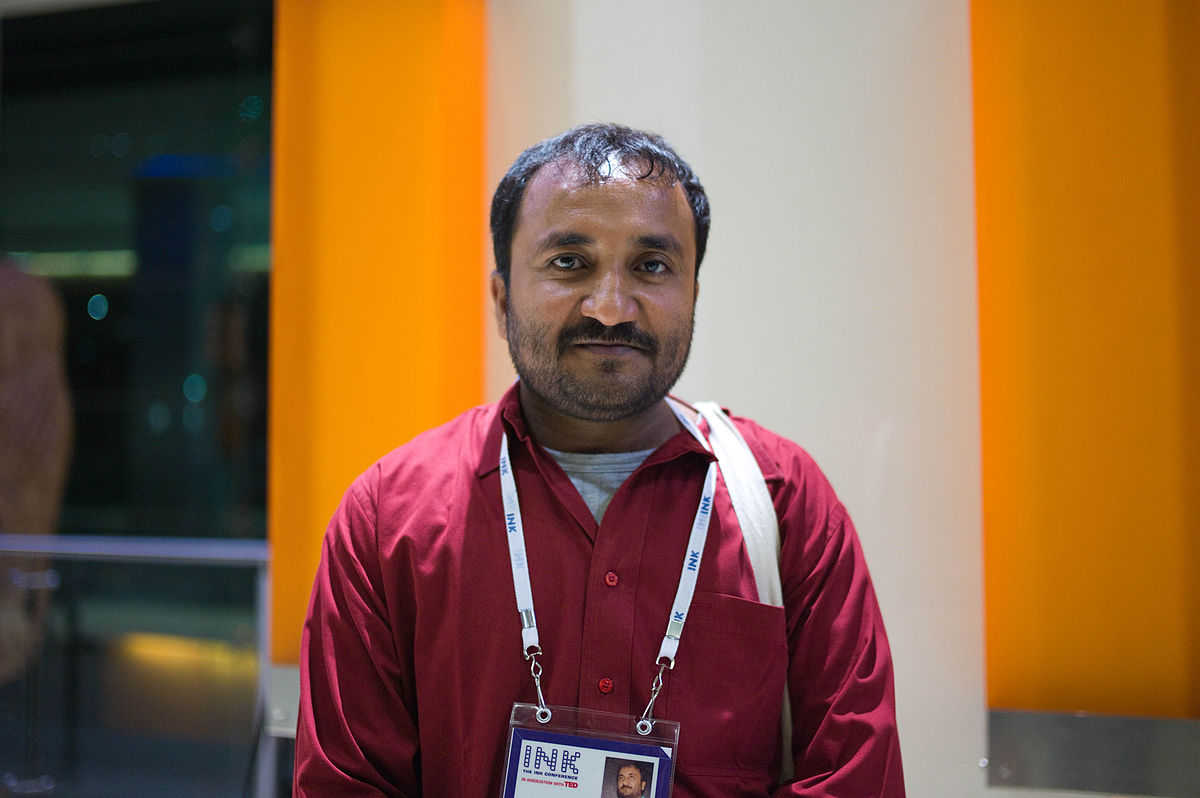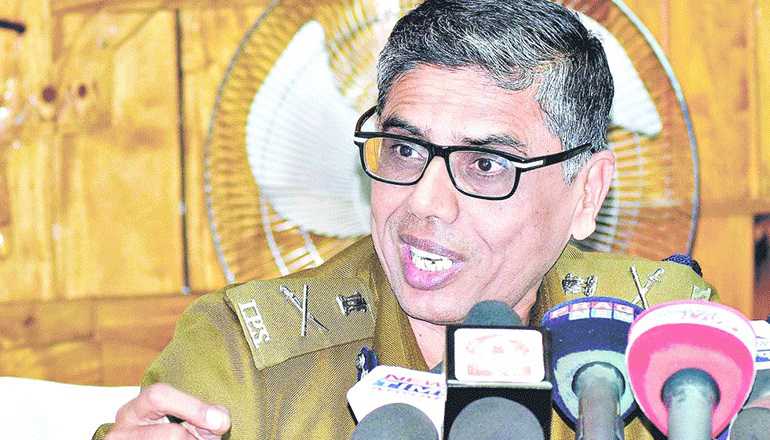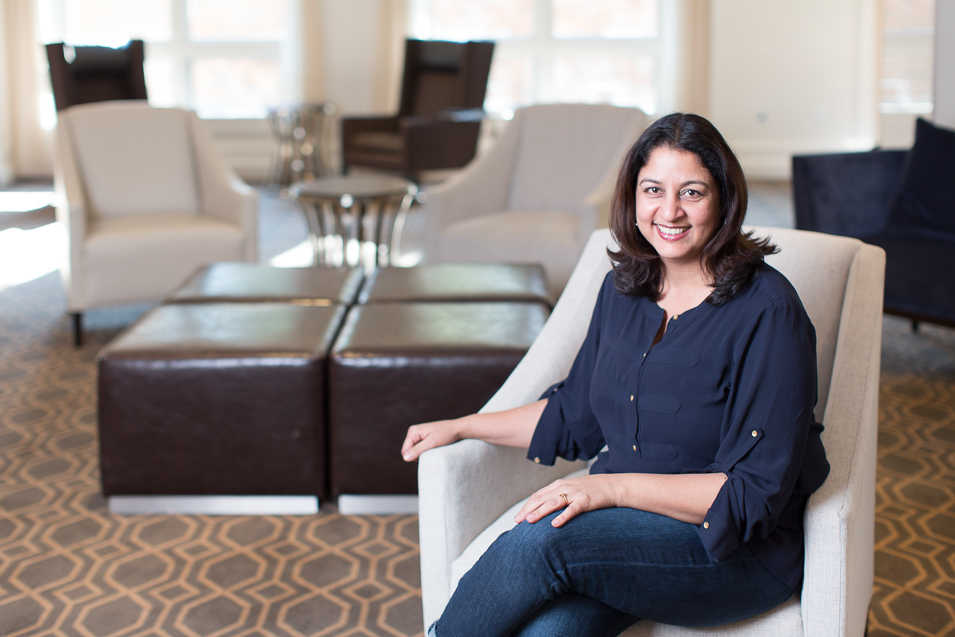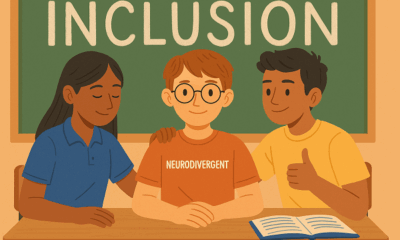Inspiration
These superheroes do not wear capes but their acts are nothing short of astonishing… and yes, they save lives. (Part 2)
It’s that special time of year again, when ScooNews felicitates the real braves of education. ScooNews takes pride and pleasure in bringing the wonderful mission of these Teacher Warriors to the forefront.
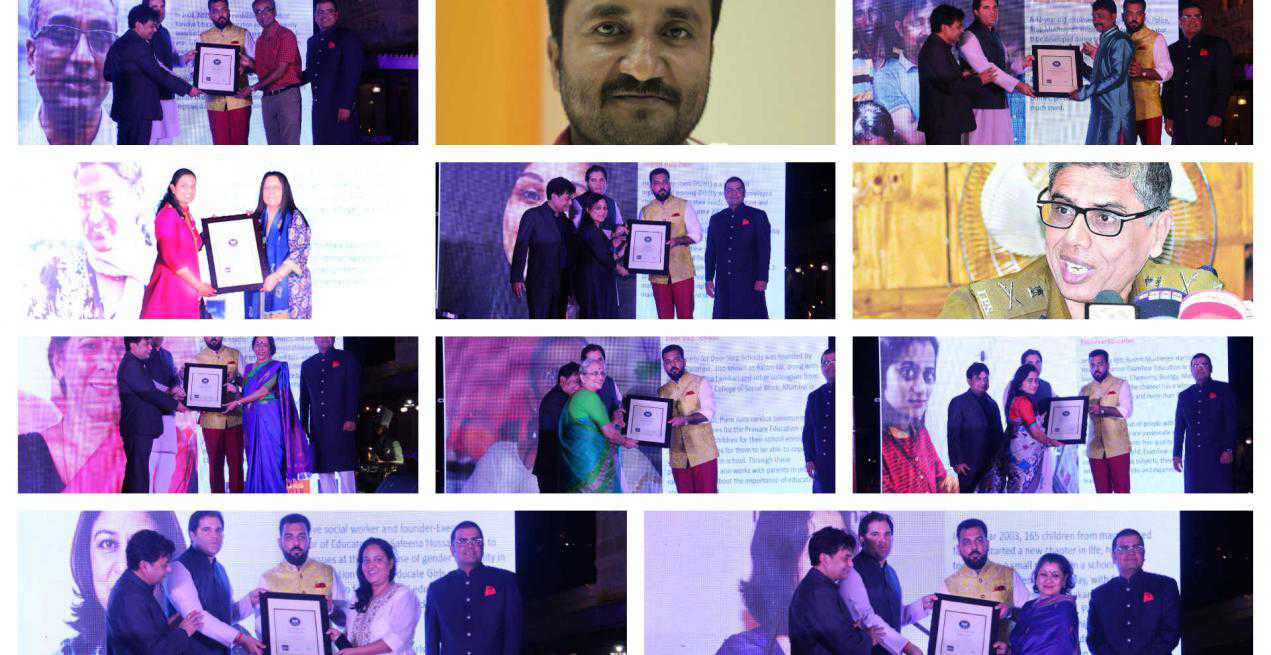
It’s that special time of year again when ScooNews felicitates the real braves of education. The ScooNews Teacher Warriors Awards 2017 put in motion the act of highlighting the heart-warming efforts of a dedicated band of men and women championing education rights for disadvantaged children. This year’s winners are similarly worthy of complete respect and emulation.
ScooNews takes pride and pleasure in bringing the wonderful mission of these Teacher Warriors to the forefront. Their endeavours are bound to inspire, as we bring readers a closer look at their mission, their beliefs and their vision. The future of underprivileged children is significantly brighter thanks to the untiring efforts of these admirable individuals, driving change against tall odds.
While the chosen Teacher Warriors were felicitated at the awards ceremony at the ScooNews Global Educators Fest 2018 in Udaipur on August 3, we bring readers a closer look at their motivation and mettle, in their own words…
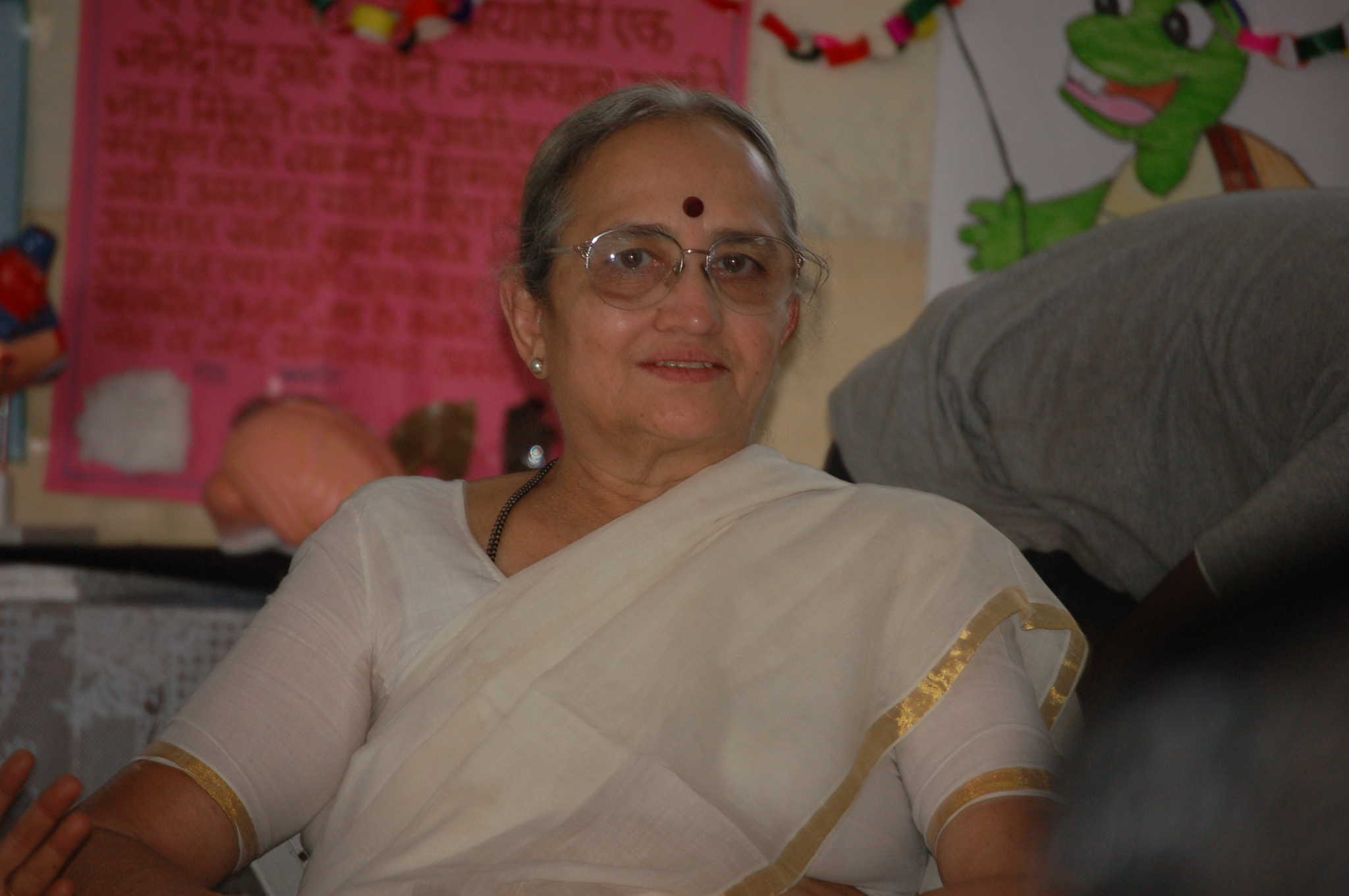
Teacher Warrior Rajani Paranjpe
Door Step Schools
The Society for Door Step Schools was founded by Rajani Paranjpe, also known as Rajani tai, along with her student Bina Lashkari and other colleagues from Nirmala Niketan College of Social Work, Mumbai in 1989. Its aim was to address the three major issues related to the education of children from marginalised sections of society through its various programs namely non-enrolment, wastage and stagnation.
Door Step School, Pune runs various community-based programmes for the Primary Education of the underprivileged children for their school enrolment and support classes for them to be able to cope up with their studies in school. Through these programmes, DSS also works with parents in order to raise awareness about the importance of education and their role in it. Door Step School also runs programmes in government schools, which are categorised as School Intervention Programmes.
Recognised for her contributions to the field of non-formal education on various occasions, Professor Rajani Paranjpe is a Rotary Club Pune Vocational Excellence awardee (2003 and 2009), Maharshi Karve Stri Shikshan Santha Bava Puraskar awardee (2008) and a Pune Marathi Granthalaya Matrusmriti Purskar awardee (2011). She currently serves as President of the Door Step School and continues to strive for the education and welfare of underprivileged children.
Igniting a spark
“During all these years of my work I have never given a thought to this question. It is difficult to say which is the most satisfying part of my work – every part of it is satisfying, must be so, otherwise, it would not have been possible for me to continue doing it year after year. But when I look at the entire process now I think the most satisfying moment in my life is the one when I see that spark in the eyes of a student which shows that he/ she has understood what I wanted to say and has opened a new gateway of ideas.”
Every child counts
“My motto is very simple and apparently very easy to achieve: I want every Indian child to be able to read and write if nothing more. I think every child counts, as every one of them, is a precious gift of God. My motivation comes from within and without. I am a teacher by nature – it is my instinct. I like to share with others what I know and always wanted to be a teacher in my life. But the motivation for the work which I am doing now is based on my experience, exposure and training. As a professional social worker, I was exposed to situations in slums, the conditions in which children live and grow and the reasons which keep them away from schooling. I used to teach Research Methodology and worked in our college’s Research Department on various research projects. This experience showed me again and again and brought to my notice very clearly that education, however minimal, makes a difference.”
Miles to go
“My field experience of working for adult literacy showed me very clearly that teaching children is far easier than teaching adults. These and such other experiences helped me in my decision to focus on the literacy of children and I am doing it to the best of my capacity but unfortunately, the end is not in sight.
My dream is to reach out to every child who does not have access to education and find out a suitable way of making that child literate. It is really disturbing to see how so many children fall through the cracks – and how so many different problems come in our way in achieving the simple goal of making every child able to read and write.”
- Anushka Yadav
Teacher Warrior Anand Kumar
Super 30
An educator, mathematician and renowned columnist for various reputed journals and magazines, Anand Kumar started Super 30 programme in Patna, Bihar in 2002. With an extraordinary vision and a down to earth attitude, he provides education to economically backward students for the toughest examination in India – IIT-JEE. A speaker at reputed institutions such as Massachusetts Institute of Technology (MIT) and Harvard University, Kumar’s work has been showcased by Discovery Channel. He has also been invited as a participant on ‘Kaun Banega Crorepati’.
Anand Kumar has made it possible for 422 out of 480 students to enroll in the IITs in 2018.
Taking education to those who lack resources
“Today, education reaches to those who can afford it whereas those who have the talent, power and the will to do something extraordinary often lack access to basic education. We at Super 30 believe in giving education to those who have that zeal and talent but lack the resources; it is this aspect of my work as an educator that makes me want to go to sleep with satisfaction every day.”
Lessons in patience
“My late father has always been my motivation and pillar of strength. I lost him at a young age but everything that he taught me continues to help me every day. He taught me how to maintain my calm even in the toughest of rides. He said it is important to be patient when someone is revolting against you even when you are doing a good deed. My father has taught me everything from how to speak and behave, to becoming a better educator. It is his words that motivate and empower me.”
Powering dreams
“My dream and vision for all the children is to live in a country where they don’t have to leave their education despite having the talent and the will to study; each child deserves to get a quality education and fulfill their dreams.”
- Anushka Yadav
Teacher Warrior Mukesh Sahay
Sonaram High Secondary School
Director General of Assam Police, tough cop Mukesh Sahay kept a tight rein on law and order during his tenure. In fact, insurgency activities had shown a sharp decline as he operated with a firm hand. Post superannuation in April this year, Sahay turned to a possibly tougher mission – teaching kids maths! Aware that the Sonaram High Secondary School in Guwahati had been functioning minus a Maths teacher for two years, he offered to fill in and that was that!
Ever practical, he points out that he is simply offering his services; at the end of the day, it depends on how the students take it. And the students are evidently taking it very well, as are the school authorities. Mukesh Sahay’s simple guiding philosophy – lighting a candle rather than cursing the darkness – mirrors his mission of quietly yet effectively making a difference.
Joy multiplied
“I was born in a village in Bihar. I did my studies in Patna. I did my post-graduation in Physics. I also have a degree in law and diplomas in i) Intellectual Property Laws in the Internet age and ii) Cyber Laws. I have been working since my school days to augment my family income and to sustain my studies. I joined in the Indian Police Service (IPS) in 1984 and worked in Assam, Central Bureau of Investigation (CBI) and Sashatra Seema Bal (SSB) in various capacities. I demitted office on April 30, 2018, as the Director General of Police (DGP), Assam. Immediately afterwards, I have been volunteering my services in school education specially in Mathematics and Physics. This is for my own pleasure primarily. If the students get benefitted, this pleasure will multiply manifold.”
Giving back
“The school where I started volunteering my services did not have a Mathematics teacher for two years for classes XI and XII. Post-retirement, I decided to fill up this gap for my own satisfaction and for the benefit of the underprivileged students. The burning desire to pay something back to society was the real motivator behind the move. This gives me great satisfaction because it helps me to keep physically active, mentally engaged and socially relevant. But the real satisfaction will come if and only if the students get benefitted, even on a nanoscale. Quality school education is the key to social transformation and is the fundamental right of every child. I am strongly of the view that all citizens, especially the educated ones, must contribute in this process.”
Try to light a candle
“I am very fond of quotations. Some of the quotations that constantly motivate and propel me are as below–
i) Rather than cursing the darkness, try to light a candle.
ii) Challenges are what make life worthwhile. Without challenges, life won’t be worth living.
iii) Struggle is life, stagnation is death.
The strong urge to do something for society, especially the less privileged and the underprivileged gives me strength, stamina and the motivation to keep moving and keep going. To help the students is my humble contribution in this direction. I am no dreamer neither am I a visionary. But I do strongly believe that quality school education is the fundamental right of every child. It is the key to transforming society. Access to quality education only can provide equality of opportunity to all and will lead to an egalitarian society driven by democratic values. A quality education will bring the best out of every child and help them actualise their potential. This will help the nation, society and civilisation achieve the desired objectives. Such an education system will provide the required knowledge, skills including life skills and attitudes to transform the children into worthy members of society, community and the nation.”
- Nichola Pais
Teacher Warrior Safeena Husain
Educate Girls
An active social worker and founder-Executive Director of Educate Girls, Safeena Hussain works to tackle issues at the root cause of gender inequality in India’s education system. Educate Girls empowers communities to facilitate girls’ education in rural India and helps them take a stand against gender inequality. Their mission stems from the belief that if girls in educationally backward districts are educated, they will have the potential to enter the formal economy, gain employment and lift their families out of poverty.
Working in partnership with the government, the community and with the help of 11,000+ community volunteers (called Team Balika), Educate Girls has helped ensure higher enrolment and attendance for girls as well as improved learning outcomes for all children.
Established in 2007, Educate Girls has grown from a 500-school pilot project in Rajasthan to now serving over 21,000 schools spread across 15 districts in Rajasthan and Madhya Pradesh. They aim to achieve the behavioural, social and economic transformation for all girls towards an India where all children have equal opportunities to access quality education.
The turning point
“I grew up in Delhi. After my schooling, I took a break and went to a Krishna Ashram on the banks of the Ganges in Rishikesh. This gap year helped me connect with my inner self and develop a sense of charity and service. After graduating from the LSE, and spending over a decade working with grassroots development projects in Latin America, Africa and Asia, I finally decided to return to India. When I moved back, as I was deciding what I should dedicate my life to next, a personal incident led me back to a cause that was always close to my heart – that of girls’ education. On a project for setting-up a clinic in a village in the foothills of the Himalayas in north India, my father and I came across a group of women. They asked him how many children he had and my father, putting his arm around my shoulder, answered, “This is it. This is my daughter, my son, my everything!” The women replied to him by lamenting his misfortune over the lack of a son. I realised in that moment, in which I felt both angry and sad, that women and girls were still being discriminated against. I asked myself what would be the most sustainable way to create gender equality – Educate Girls was the answer. After a 50-school test project followed by a 500-school pilot project in Pali, Rajasthan, Educate Girls was independently registered in 2007. Since then, Educate Girls has consistently scaled its operations and presently works across 15 districts of Rajasthan and Madhya Pradesh. There are over 4.9 million total beneficiaries of its programmatic interventions, since inception. Educate Girls works in educationally backward districts by partnering with the government and mobilising communities to achieve impact in three key outcome areas – Increased enrolment and retention of girls and quality learning for all children.”
Education’s transformative power
“I once remember asking an out-of-school girl, ‘What do you want to be when you grow up?’ She replied, ‘I don’t know, No one has ever asked me this question, so I’ve never thought about it.’ This same girl, enrolled in school by Educate Girls, is now studying well and aspires to be a police officer. This is the transformative power of education! I am firmly convinced that education is the most effective means of offering the same opportunities to excel in life for girls and boys, women and men – thus promoting social equality. I strongly believe that creating community ownership and involving people in the process of social transformation is a powerful way to sustain change. Our volunteers from the villages have a motto, ‘My village, my problem, I am the solution’. Also, we have seen that in patriarchal communities it is essential to involve the men and boys in conversations. More often than not, girls are not aware of their rights and boys don’t know that they are violating a girl’s rights. Ultimately, gender-inequality is a mindset issue and that’s what our activities address.”
Educating one girl – educating future generations
“Not a single girl I have met so far has said to me that she does not want to be in school. For me, and everyone at Educate Girls, nothing compares to the joy of seeing girls, in their school uniforms, with their book and bags, walking to school and learning well! We celebrate every single enrolment because we know that by educating that one girl we have educated future generations! The feeling of seeing a child improve in their learning because of some additional help from us is phenomenal. Ultimately, the fulfilment in achieving actual impact for these underserved children is what keeps us going in spite of the challenges and setbacks and this is why we so work hard. This commitment to every child has always been at the forefront for Educate Girls and because my vision was about solving a widespread issue, from the start Educate Girls’ model was about being ready for scale. When we started expanding to more districts I wanted to be sure that Educate Girls would continue to be accountable to the last child and so we have always pursued innovation and partnerships that enable this accountability. This is also why Educate Girls initiated the world’s first Development Impact Bond (DIB) in education, which is a proof of concept that ties funding to pure outcomes. My dream is to one day wake up to an India where every daughter in the country is no longer discriminated against and where every child has access to quality education and equal opportunity.”
- Nichola Pais
Education
Daring to Dream: Six Years in the Heart of Rural Rajasthan
Across India’s government schools, millions of students are first-generation learners—navigating education without inherited privilege or guidance. Dare To Dream, a documentary filmed by Ranu Ghosh over six years in rural Rajasthan, brings these lived realities into focus through the stories of young girls from the Rabari community. This feature (like the documentary) explores how education becomes dignity, protection, and possibility—and why such stories matter deeply to classrooms, educators, and communities across the country.

The journey of a thousand miles begins with a single step. For many girls in India’s rural communities, that step is often blocked—by tradition, by circumstance, and by expectations set long before they are old enough to question them.
In Banswara district of southern Rajasthan, filmmaker Ranu Ghosh spent six years documenting what it means to take that step anyway. The result is Dare To Dream, a documentary that offers an intimate, unflinching look at first-generation learners, gender, and education within the Rabari community—a community rich in cultural knowledge yet constrained by rigid social norms that frequently limit the lives of its daughters.
A community of knowledge—and contradiction
The Rabaris are globally recognised for their generational expertise in camel breeding and their close relationship with nature, mobility, and craft. Their cultural heritage is admired and celebrated, yet the community remains socially isolated, shaped by traditions that are slow to evolve.
Within this context, women often face early marriage, restricted mobility, and limited access to education—realities rarely portrayed with nuance in mainstream narratives. Dare To Dream avoids simplistic portrayals of victimhood. Instead, it presents a layered reality where hardship coexists with dignity, resilience, and quiet strength.

“There is a constant struggle to balance tradition with modernity,” Ghosh observes. “These communities are trying to preserve their identity while adapting to a world that often does not accommodate their way of life.”
The invisible journey of first-generation learners
For many students in India’s government schools, education is a journey undertaken without a map. These are first-generation learners—children whose parents never had the opportunity to complete, or even begin, formal schooling.
“For them, education is not only about studying subjects,” says Ghosh. “It is about dealing with uncertainty, responsibility, and self-doubt from a very young age.”
Their challenges are layered. Academic support at home is limited, financial insecurity is constant, and schooling must often be balanced with household responsibilities and strong social expectations. Beyond these visible constraints lies a quieter, internal struggle—whether it is acceptable to aspire at all.
Yet Dare To Dream shows that ambition persists even within these limits. The aspirations of these children are shaped not by entitlement, but by resilience and determination. Every milestone—learning English, completing a grade, staying in school a little longer—becomes a meaningful act of perseverance.
“Dreaming,” Ghosh notes, “is not a privilege. It is a right.”
When education becomes protection
The documentary’s emotional core lies in the contrasting journeys of three women, revealing how education shapes lives in profoundly different ways.

Ganeshi’s story is one of quiet defiance. Married at a very young age, she was unusually allowed to remain at her parents’ home to continue her education. She later became the first English secondary-level teacher from her community in a government school—moving to her in-laws’ home only after securing her job.
Her sister, Swapna, followed a similar path. She completed her education, found employment, and married later, breaking a cycle that had long seemed inevitable.
In contrast, Reena’s story shows what is lost when education is cut short. Married before completing school, she became a mother too early and passed away at just twenty-nine.
“Education is more than opportunity,” Ghosh reflects. “It is protection, voice, and hope. When girls are denied education, what is taken away is not just learning, but the chance to choose.”
Why these stories matter in classrooms
Ghosh believes that audio-visual storytelling has a unique ability to reach young people—especially those who rarely see their own lives reflected in books or media. Even in remote regions, mobile phones and social media are deeply embedded in everyday life.
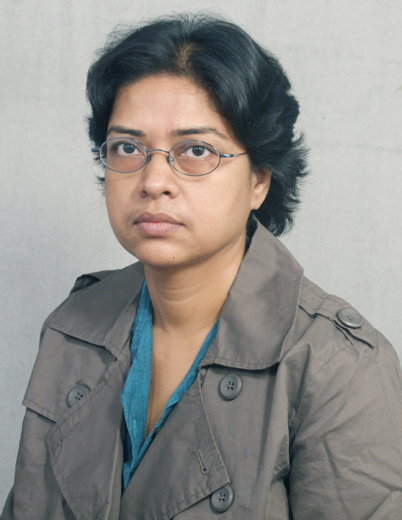
“When students see lives similar to their own on screen,” she says, “they begin to feel seen. They realise that their experiences and struggles matter.”
She hopes screenings of Dare To Dream in villages and government schools can affirm students’ aspirations
while also serving as a reminder to educators of the influence they hold.
“Sometimes,” she adds, “a small gesture of encouragement from a teacher can change the course of a child’s life.”
For communities, the film creates space for dialogue—about education, gender, early marriage, and the difficult balance between tradition and change. Importantly, these conversations emerge without judgement, allowing reflection rather than resistance.

Beyond slogans, towards quiet change
After six years of documenting these lives, Dare To Dream leaves behind a powerful truth: meaningful change is often incremental. It unfolds in classrooms where teachers persist, in families that choose education over early marriage, and in girls who dare to imagine futures different from those prescribed to them.
If the film succeeds in helping even a few girls take one step closer to that freedom, it reinforces a larger truth—when first-generation learners from marginalised communities are trusted and supported, they do not just change their own lives. They reshape the future of others as well.
Inspiration
Before the Nobel, There Was a Teacher
Before Albert Camus was the voice of a generation, he was an invisible child in a house without books. He was a boy whose future was already written by the harsh ink of illiteracy and loss. Then came the intervention that changed everything. Decades later, at the pinnacle of human achievement, Camus would look back at his Nobel Prize and realize it was built upon a foundation laid by a single elementary school teacher. “I remain your grateful pupil,” Camus wrote to his mentor—a phrase that serves as a timeless anthem for every educator who has ever looked at a struggling student and said: You matter.

The Day Everything Changed
Paris, October 1957
Albert Camus was 43 years old when the telegram arrived.
He unfolded the message and read the words that would secure his place in literary history: he had been awarded the Nobel Prize in Literature.
He was one of the youngest recipients ever. The world saw him as the conscience of his generation — the author of The Stranger, The Plague, The Myth of Sisyphus — a writer who had captured the absurdity and alienation of modern life.
The celebrations would soon follow: journalists, interviews, speeches, congratulations.
But Camus’ mind went somewhere else entirely.
After thinking of his mother, he thought of a man in a quiet classroom many years earlier — the teacher who had once looked at a poor, silent boy and seen a future no one else imagined.
That night, Camus sat down to write a letter.
A Childhood on the Margin
Born Into Poverty — French Algeria, 1913
To understand the letter, you must understand where Camus began.
Albert Camus was born in Mondovi, French Algeria, on November 7, 1913.
His father, Lucien, was killed in World War I before Albert turned one. His mother, Catherine, was partially deaf, nearly illiterate, and worked as a cleaner so her children could eat.
The family lived in a cramped apartment in the working-class Belcourt district of Algiers — no electricity, no running water, no books. Poverty wasn’t merely a condition; it was an entire world with sharply defined limits.
In such neighborhoods, school was a holding place. Working-class children learned the basics, then quit to earn wages. No one expected one of them to become a writer.
Camus sat in class: thin, watchful, quiet. A child easy to overlook.
Except one person didn’t overlook him.
The Teacher Who Refused to Let Him Disappear
Louis Germain’s Quiet Intervention
Louis Germain, Camus’ elementary school teacher, noticed something unusual about the boy:
- the intensity in his eyes
- the way he listened
- the unresolved questions beneath his silence
Germain decided that poverty would not define this child’s future.
He gave Albert extra help.
He handed him books — more than the boy had ever seen at home.
He stayed after school to explain ideas, encourage curiosity, and open windows Camus never knew existed.
Then came the decisive moment: the competitive exam for admission to lycée, the gateway to higher education — a path almost never offered to children of Camus’ background.
Germain tutored him personally.
He convinced administrators to let Albert sit for the exam.
He prepared him, defended him, believed in him.
Camus passed.
From that moment, his life opened: secondary school, university, journalism, Resistance work during World War II, philosophy, novels, essays — and eventually, worldwide recognition.
But beneath every achievement was that first act of belief.
Camus never forgot it.
The Letter of Gratitude
November 19, 1957
After the Nobel Prize announcement, Camus waited for the noise to fade.
Then he wrote to “Monsieur Germain.”
He thanked his teacher for the kindness and patience shown to a poor child who needed someone to see him. He confessed that when the Nobel news arrived, after his mother, his first thought was of Germain.
He wrote that without his teacher’s influence, none of his success would have existed. He wanted Germain to know that the time, the generosity, and the belief he had invested in that quiet boy lived on in the man the world now celebrated.
Camus ended with a line that has echoed through generations:
“I remain your grateful pupil.”
The Teacher’s Reply
A Humble Answer From Across the Years
Louis Germain, now an older man, wrote back.
He did not take credit for shaping a great writer.
Instead, he expressed the simple joy of having helped a student use his education well — that, he said, was the true reward of teaching.
Across decades and continents, they met again — not in a classroom, but in a pair of letters that captured the enduring connection between a teacher and a child who needed one.
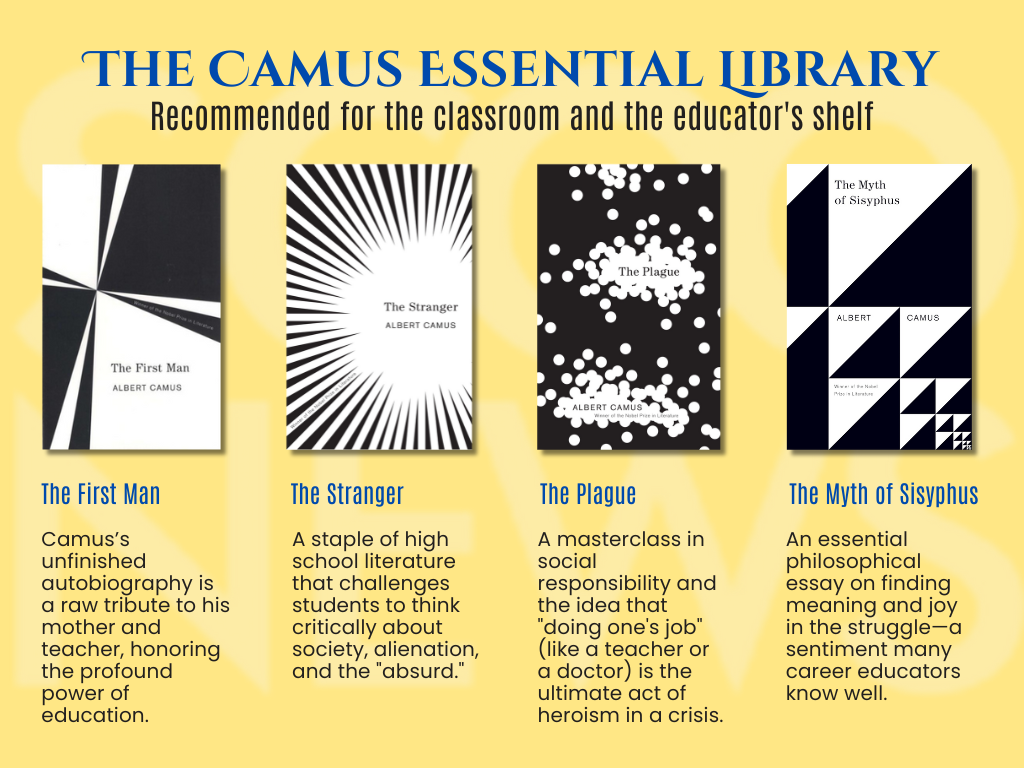
The Final Pages of a Short Life
January 4, 1960 — The Last Journey
Just over two years after receiving the Nobel Prize, Camus died in a car accident on January 4, 1960. He was 46.
In his briefcase, investigators found the unfinished manuscript of The First Man, a novel in which he began exploring his childhood and the two figures who shaped him most deeply: his mother and his teacher.
Among his belongings were the letters from Louis Germain — carefully preserved, carried with him always.
Even at the height of fame, he kept tangible proof of who opened the door for him.
The Quiet Heroes Behind Every Success
The Camus–Germain Story Is Not Just Theirs
This isn’t only a story about Albert Camus and one extraordinary teacher.
It’s about the invisible army of Louis Germains everywhere:
- the teacher who gave you books because you were hungry for more
- the professor who took your questions seriously
- the mentor who wrote a recommendation letter that changed your life
- the adult who said: You matter. Keep going.
Most will never receive thank-you letters from Nobel laureates.
Many will retire never knowing which seeds they planted grew into forests.
Yet somewhere, a child they believed in is building a life once thought impossible.
What Camus Teaches Us
Success Is Never Self-Made
Camus’ letter cuts through the myth of self-made genius:
Look back.
Remember who saw you when you were invisible.
Say thank you while you can.
Albert Camus won the Nobel Prize at 43.
His first instinct wasn’t I earned this.
It was I owe this.
In a universe he believed lacked inherent meaning, Camus chose gratitude — a meaning built from memory, humility, and human connection.
He remembered the woman who cleaned houses so he could attend school.
He remembered the teacher who stayed late to explain how the world worked.
He remembered the moment someone reached across poverty and said:
You matter. You can go further.
And he said thank you.
Inspiration
Umeed: A Ray of Hope for Better Tomorrow
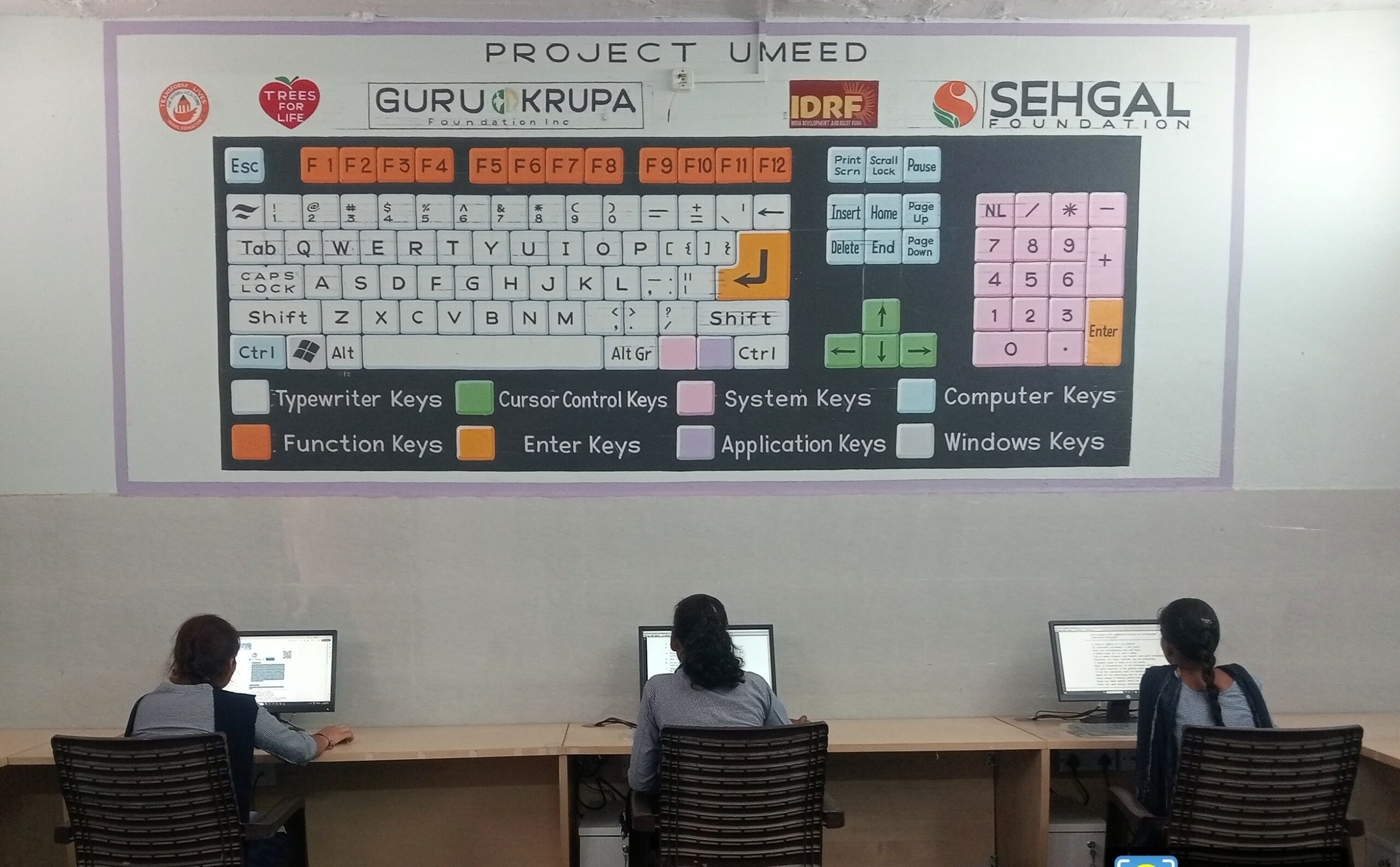
“I used to be hesitant to speak on stage, but after participating in the life skills sessions, I gained confidence. Thanks to Project Umeed,” shared Sanjana, student of Government Senior Secondary School, Kurthala, Nuh, Haryana.
The project Umeed creates equitable learning opportunities for rural schoolchildren by providing enhanced Digital and Life Skills Awareness (DLSA), leading to their overall learning and empowerment. The project is a partnership with Teach for Life supported by Trees for Life, India Development, and S M Sehgal Foundation, which is implementing the project on the ground.
The DLSA course has been operational at Government Senior Secondary School, located in village Kurthala, block Nuh, Haryana, since March 2025. Sixty students are enrolled in this course that is led and facilitated by a dedicated instructor.
The course covers essential topics related to learning about computers, technology, and cyber safety; developing important social and emotional abilities in children; building self–confidence, providing career guidance for goal setting; gaining knowledge about local participation for village development, familiarity with key government programs, and becoming informed, engaged citizens.
Topics such as “Me and My Self” and “Communication Skills” boost children’s confidence strengthen their thinking abilities and communication aptitudes.
Students Shine at the Youth Parliament
With this new learning and enthusiasm, two girl’s students, Sanjana and Renu from Govt. Sr. Sec. School, Kurthala, Nuh, who attend the DLSA classes, were selected for the Youth Parliament program. They were both excited and a little hesitant. They diligently prepared and practiced their skills on effective communication, brainstorming and role playing for over a month. Finally, on the day of the event, the entire auditorium erupted in applause as the girls confidently shared their thoughts on the Youth Parliament. Sanjana moderated the event as speaker, and Renu presented her views as finance minister. Other students participated as members of Parliament. The whole process further strengthened the students’ understanding of social issues and the democratic process. The event showcased the students’ development of confidence and leadership skills.
“I realized how important it is to present your thoughts clearly. This experience helped me hone my life skills, especially the topics of communication skills and ‘Me and Myself’ had a deep impact on me.” – Renu, student, Govt. Sr. Sec. School, Kurthala, Nuh, Haryana
The same course is being conducted at Government Senior Secondary School, Badarpur village, bock Nagina, district Nuh, with another sixty students. As part of their digital awareness sessions, students learned how to use computers and online platforms to access government programs and services. They were taught the importance of the Aadhaar card and guided through the process of downloading or updating their Aadhaar credentials. Students were made aware that their Aadhaar card serves to establish and safeguard their identity, enabling them to access government services and avail different benefits.
Earlier, the students had to depend on the Common Service Centre or Aadhaar Seva Kendras, located 2–3 km away from the village, to download or update government documents such as the Aadhaar card, ration card, or other certificates. Each time they had to update their documents, they had to pay a fee of as much as Rs 100, plus a transportation cost of Rs20. Even then, issues often remained unresolved, forcing them to make repeated trips.
With their newfound confidence in using technology, students no longer need to visit CSC centres and Aadhaar service centres repeatedly, thus saving both time and money. This experience has proven to be a significant step toward achieving autonomy.
The students’ parents and the village council were deeply impressed by this initiative. They expressed their gratitude to S M Sehgal Foundation and urged that more such digital awareness courses should run in the future, so that other people of the village can also become digitally empowered.
About the Authors: Indu Verma, Sr. Program Lead, Transform Lives one school at a time, S M Sehgal Foundation
Mahesh Sharan and Mosim Khan, Instructors, Transform Lives one school at a time, S M Sehgal Foundation
Education
17-year-old Innovator Designs Learning Tools for the Visually Impaired

At just 17, Singapore-based student Ameya Meattle is proving that age is no barrier to impact. What began as a small idea to make education more accessible has evolved into a mission that is transforming how visually impaired learners experience learning and skill development.
Ameya founded Earth First at the age of 14 — a social enterprise that helps visually impaired individuals “earn and learn” by creating sustainable, eco-friendly products. Working with eight NGOs across India and Singapore, the initiative has trained more than 100 visually impaired students and launched over 23 sustainable product lines, from tote bags and jute placemats to macramé planters. Each design is adapted to provide hands-on learning opportunities and help trainees gain confidence in both craft and enterprise.
Beyond social entrepreneurship, Ameya has focused deeply on education and technology. He led a Python programming course for 50 visually impaired students, designing custom training modules that made coding accessible through screen readers and tactile tools. By introducing technology as a viable career pathway, Ameya hopes to help students move from manual tasks to high-skill, digital opportunities.
His work also extends into assistive technology research. Under the mentorship of Dr. Pawan Sinha at MIT, Ameya developed a VR-based diagnostic game to assess visual acuity in children — turning the process into an interactive experience rather than a clinical test. The tool is being piloted at MIT’s Sinha Lab and with Project Prakash in India, helping doctors evaluate and track visual development before and after eye surgeries.
In addition, during his internship at the Assistech Lab at IIT Delhi, Ameya worked on designing tactile STEM teaching aids, such as accessible periodic tables and coding tutorials for visually impaired learners. His goal, he says, is not just to innovate but to make scientific learning inclusive and joyful for all.
Ameya’s work highlights how education, empathy, and innovation can intersect to create a more equitable future — one where technology serves not just progress, but people.
Education
Class 11 Student Navya Mrig on a Mission to Bust Myths About Organ Donation
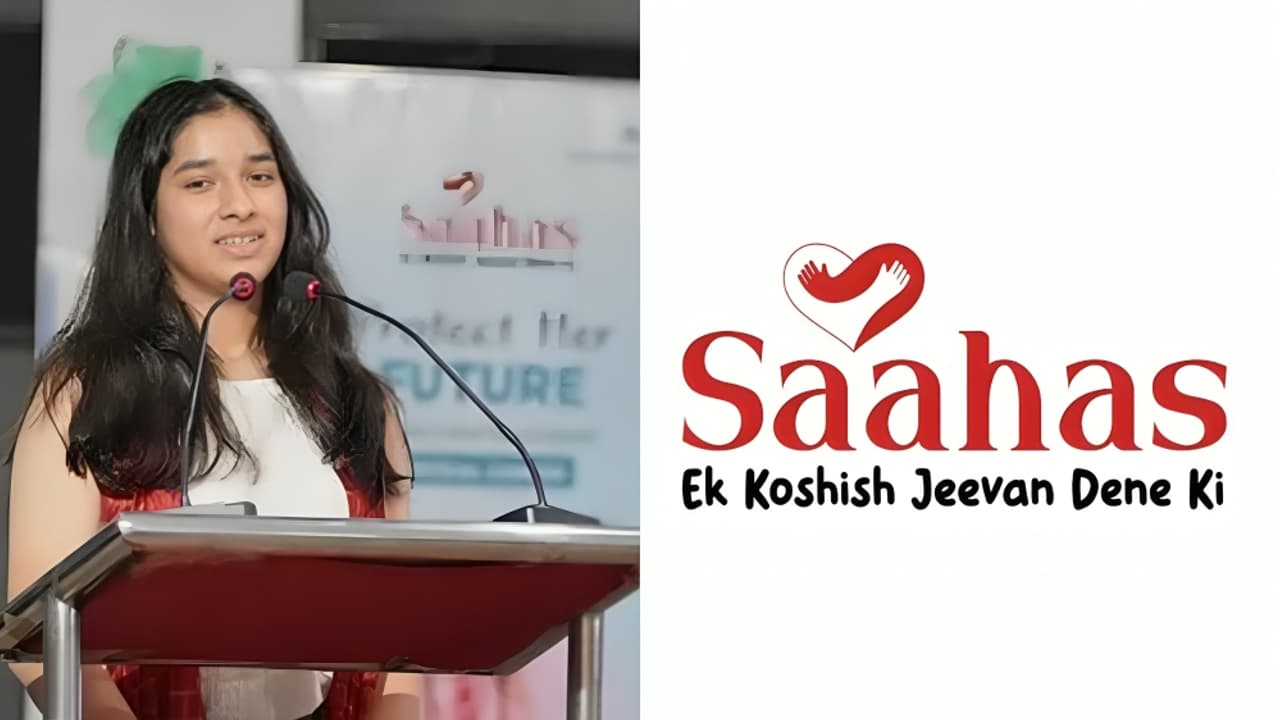
Saahas, a Delhi-based non-profit organisation founded by Class 11 student Navya Mrig of The Ram School, Moulsari, Gurugram, is creating awareness about organ donation and working to counter myths that prevent families from giving timely consent.
Established in 2024, Saahas focuses on every aspect of organ donation, particularly deceased organ donation where family approval must be granted quickly. The organisation highlights that hesitation and misinformation often stop families from making decisions that could save lives.

To address this, Saahas conducts workshops, myth-busting talks, and seminars in schools, resident welfare associations, hospitals, and workplaces. These sessions explain processes such as brain-stem death certification and the role of family consent in simple, clear terms. Each session concludes with practical guidance, ensuring participants leave with both knowledge and actionable steps.
The initiative has also developed resource kits with slide decks, facilitator notes, QR-linked checklists, and referral contacts to make it easier for schools and institutions to host repeatable sessions. Saahas partners with community groups and healthcare institutions to co-host Q&A sessions with clinicians and transplant coordinators, and also honours donor and recipient families through small ceremonies that highlight the impact of organ donation.
At its core, Saahas is designed to bring organ donation discussions into everyday spaces rather than waiting for the urgency of hospital decisions. By focusing on conversations in classrooms, community meetings, and staff rooms, the organisation aims to gradually build a culture where organ donation is better understood and more widely accepted.
Navya’s initiative reflects how young people are increasingly taking up important social causes and contributing to public awareness campaigns with structured, replicable models.
(News Source- ANI)
Education
Educate Girls Becomes First Indian NGO to Win the Ramon Magsaysay Award
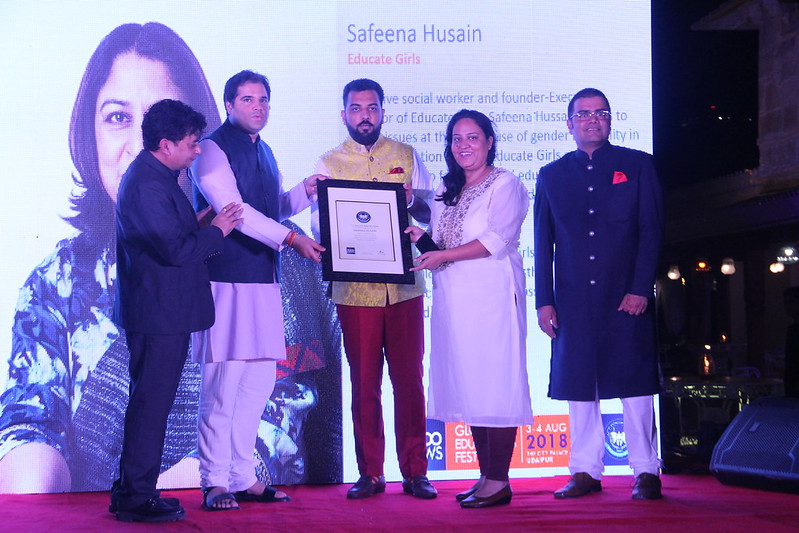
In a landmark recognition for Indian education and grassroots activism, Educate Girls, founded by Safeena Husain, has been named one of the recipients of the 2025 Ramon Magsaysay Award. Often referred to as Asia’s Nobel Prize, this honour highlights the organisation’s transformative work in enrolling and empowering out-of-school girls across some of India’s most remote and underserved regions.
The announcement marks a historic moment — Educate Girls is the first Indian organisation to ever receive this award, underscoring the global importance of its mission. Alongside Educate Girls, the other awardees include Shaahina Ali from the Maldives for her environmental work and Flaviano Antonio L. Villanueva from the Philippines. The formal ceremony will take place on November 7 at the Metropolitan Theatre in Manila.
Safeena Husain: From Teacher Warrior to Global Recognition
For ScooNews, this moment carries a special resonance. In 2018, Safeena Husain was celebrated as a Teacher Warrior, honoured for her vision of tackling gender inequality at the root by ensuring that every girl receives access to education. What started as a 50-school test project in Rajasthan has since scaled into an expansive movement spanning 21,000 schools across 15 districts, supported by a network of 11,000+ community volunteers known as Team Balika.
Her journey, as she has often recalled, was shaped by both personal and professional turning points. After studying at the London School of Economics and working in grassroots projects across Latin America, Africa, and Asia, Safeena returned to India, deeply aware of the entrenched discrimination girls faced. A family encounter in a village, where her father was pitied for not having a son, crystallised her resolve to fight for gender equity through education.
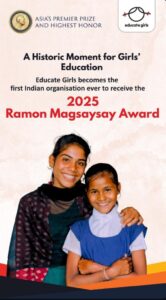
Breaking Barriers in Education
Educate Girls has gone beyond enrolling girls into schools. Its programmes aim at:
-
Increasing enrolment and retention of out-of-school girls
-
Improving learning outcomes for all children in rural districts
-
Shifting community mindsets through participation and ownership
The organisation has also pioneered innovative financing models such as the world’s first Development Impact Bond (DIB) in education, tying funding directly to learning outcomes.
Safeena has often spoken about the transformative power of education citing stories of girls who once had no aspirations simply because nobody asked them what they wanted to be, and who today, thanks to education, dream of becoming doctors, teachers, or even police officers.
Global Platforms, Indian Roots
Safeena’s vision has found resonance globally. In her TED Talk titled “A Bold Plan to Empower 1.6 Million Out-of-School Girls in India”, she emphasised that girls’ education is the closest thing we have to a silver bullet for solving some of the world’s toughest problems from poverty to health to gender inequality. In 2023, she was also awarded the WISE Prize for Education, cementing her reputation as one of the leading voices in education worldwide.
But even as Educate Girls receives international acclaim, its deepest impact continues to be felt in the dusty lanes of rural Rajasthan and Madhya Pradesh, where every single enrolment represents a victory against entrenched social barriers.
Why This Award Matters
The Ramon Magsaysay Award not only recognises Safeena Husain’s leadership but also places Indian NGOs on the global stage. It sends a powerful message: education is both the foundation of equity and the key to transformation. For India, a country with one of the world’s largest populations of out-of-school girls, this award validates years of struggle, innovation, and community-driven action.
For ScooNews, which first honoured Safeena as a Teacher Warrior in 2018, this moment is both proud and historic. It shows that when educators and changemakers stay rooted in their vision, their work can resonate far beyond borders.
Education
In Every Smile, a Victory – Sandhya Ukkalkar’s Journey with Jai Vakeel’s Autism Centre
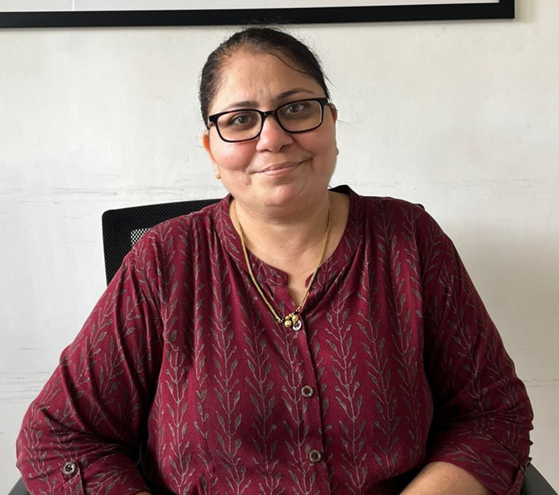
For Sandhya Ukkalkar, the path to becoming an educator in the field of special education was never just a professional decision — it was deeply personal. It began in the quiet, determined moments of motherhood, as she searched for a school that could truly understand her son’s unique needs. Diagnosed with Autism and Intellectual Disability, he required more than care — he needed acceptance, structure, and a nurturing environment.
In 1996, a compassionate doctor guided her to Jai Vakeel School. From the moment her son was enrolled, Sandhya witnessed a transformation that brought not only relief, but hope. Encouraged by the school’s doctor, she enrolled in a special education course, and by June 2000, she returned to the same institution — this time as a teacher. Over the years, she grew into the role of Principal of the Autism Centre at Jai Vakeel, dedicating her life to children who, like her son, simply needed to be seen, understood, and supported.
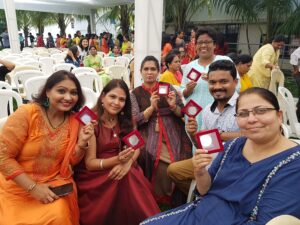
What sets the Autism Centre apart is not just its experience or legacy, but its guiding philosophy: a child-led, strengths-based approach that celebrates neurodiversity. Here, each learner follows an Individualised Education Plan (IEP), supported through small groups, one-on-one sessions, and methodologies that include Applied Behaviour Analysis (ABA), Sensory Integration, and Visual Supports. The goal isn’t to fit children into a mould but to honour their unique ways of engaging with the world.
Serving children aged 3 to 18, the centre focuses on early intervention, functional academics, and pre-vocational training — all grounded in a multisensory curriculum aligned with NCF and NCERT. For the 31 students with Autism and Intellectual Disability who currently attend, the emphasis lies on building communication and sensory skills that can translate into real-world independence.
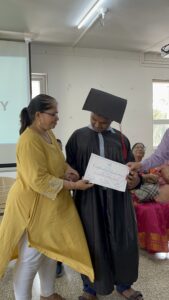
Sandhya believes collaboration is the cornerstone of success. At the centre, therapists, educators, parents, and healthcare professionals work as a unified team. Over 75% of the children served come from low-income families, and many receive free or subsidised education and therapy through rural camps and outreach programs.
“These aren’t luxuries,” Sandhya insists, referring to tools like sensory rooms and assistive tech. “They’re essentials.”
And the results are deeply moving. Children who once struggled with attention now engage joyfully in sessions. Some who were non-verbal begin to use gestures, visuals, and eventually words. Others transition into mainstream schools. One student, now preparing for CA exams, once needed foundational classroom readiness support. These are not isolated cases — they are the product of consistent, individualised attention and belief.
For Sandhya, the real victories come in the smallest moments: a child pointing to a picture to communicate, another who finally sits through a full session, or a parent whispering “thank you” with tears in their eyes. These everyday breakthroughs are everything.
Her personal experience as a parent gives Sandhya a unique lens. She understands the fears, hopes, and quiet triumphs families carry. That’s why parental involvement is not optional at the centre — it’s essential. Families regularly participate in progress meetings, classroom observations, and hands-on training. Home goals — practical and doable — are shared, and customised visual aids help ensure continuity beyond school hours. Emotional support is offered just as readily as academic strategies.
Still, the challenges are real. There is a pressing shortage of professionals trained in autism-specific interventions, especially for students with high support needs. Assistive communication tools are expensive and often out of reach. Space is limited, even as demand grows. Sandhya dreams of expanding — with dedicated sensory rooms, inclusive playgrounds, and classrooms designed for neurodivergent learners. “These help children feel safe, calm, and ready to learn,” she says.
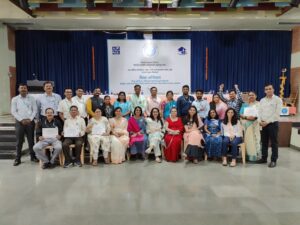
Her vision for the future is clear: inclusion that goes beyond tokenism. She dreams of classrooms where neurodivergent children aren’t merely accommodated, but genuinely valued — where belonging is a given, not a gift. To get there, she believes we must build on three pillars: Mindset (a shift from awareness to true acceptance), Capacity (training educators, therapists, and families), and Belonging (where every child is emotionally safe and socially included).
As she looks ahead, Sandhya hopes to increase enrolment, offer structured training for parents and teachers, partner with inclusive schools for smooth transitions, and support students well into adulthood — through vocational training, community participation, and self-advocacy.
Her journey is a reminder that special education isn’t just about what children need — it’s about what they deserve.
Because, as Sandhya says,
“In every smile, there’s a victory. And every child deserves to smile.”
Read the full story in our issue of Teacher Warriors 2025 here.
Education
Indian Army to Sponsor Education of 10-Year-Old Who Aided Troops During Operation Sindoor
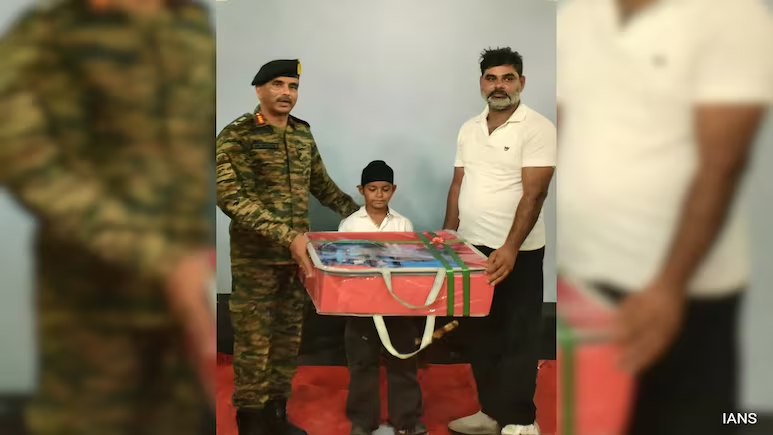
In a heartwarming gesture of gratitude, the Indian Army has pledged to fully sponsor the education of 10-year-old Shvan Singh, a young boy from Punjab’s Ferozepur district who supported troops with food and water during the intense gunfire of Operation Sindoor.
During the cross-border conflict in early May, Shvan—then mistakenly reported as ‘Svarn’ Singh—fearlessly stepped up to help soldiers stationed near Tara Wali village, just 2 km from the international border. With lassi, tea, milk, and ice in hand, the Class 4 student made repeated trips, delivering supplies to the troops amid ongoing shelling and sniper fire.
Moved by his courage, the Golden Arrow Division of the Indian Army has now taken full responsibility for Shvan’s educational expenses. In a formal ceremony held at Ferozepur Cantonment, Lt Gen Manoj Kumar Katiyar, General Officer Commanding-in-Chief of the Western Command, felicitated the boy and applauded his spirit of service.
“I want to become a ‘fauji’ when I grow up. I want to serve the country,” Shvan had told media in May. His father added, “We are proud of him. Even the soldiers loved him.”
Shvan’s actions during Operation Sindoor—India’s strategic missile strike on nine terror camps across the border in retaliation to the Pahalgam attack—have now turned him into a symbol of quiet heroism and youthful patriotism.
In a world where headlines are often dominated by despair, Shvan’s story reminds us that bravery has no age—and that the seeds of service can bloom early.
Education
Lighting the Way, One Beam at a Time – Monika Banga
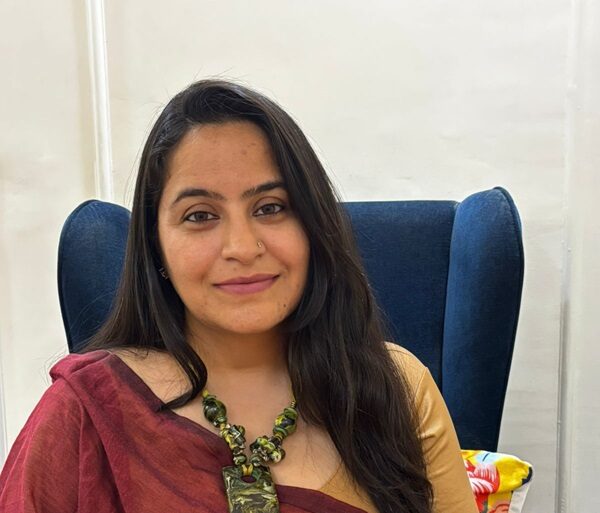
In the stillness of the COVID-19 lockdown—when the world hit pause and uncertainty gripped communities—Monika Banga quietly sparked something radical. Not radical in funding or scale, but in spirit. Born out of a moment of global stillness, The LightBeam Project wasn’t launched with loud declarations or big grants. It began as something far more intimate: a bridge between continents, classrooms, and possibilities.
But Ms. Monika’s journey didn’t start there. It began over a decade earlier, in under-resourced classrooms where she worked with children who had never known structured learning, or imagined speaking with someone from another country. With over 12 years of experience, she didn’t just teach—she listened. And what she heard, again and again, was a hunger not for food, but for discovery, belonging, and expression.
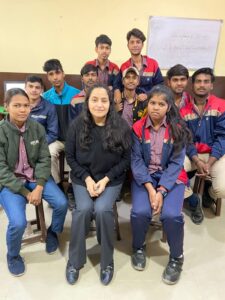
When the Granny Cloud initiative—a volunteer-driven project that connected retired educators with children—came to a close, Monika felt the silence it left behind. Along with her friend and fellow educationist Lesley Keast from Spain, she wondered: What if that spark of connection could be reignited? That one idea gave birth to The LightBeam Project. It began modestly: a handful of volunteers, one school, a few curious children, and shaky internet. But it carried a powerful belief: every child has the right to dream, and someone, somewhere, will listen.
Unlike traditional education interventions, LightBeam didn’t come with a manual. It came with open-ended conversations. Sessions inspired by SOLE (Self-Organised Learning Environments) nudged children toward self-discovery. Initially, the children were hesitant.
“They were used to answers, not questions,” Monika recalls.
But soon, wonder took over. They began asking: Why do we age? What if all insects disappeared? These weren’t sessions—they became rituals of curiosity.
As their questions deepened, so did their digital skills. Devices once used for distraction turned into tools of creation. Children began making digital presentations, recording videos, and sharing local traditions with volunteers across the globe. One girl proudly made a Canva slideshow introducing her Beamer to her village’s customs. These weren’t just projects. They were windows into identity.
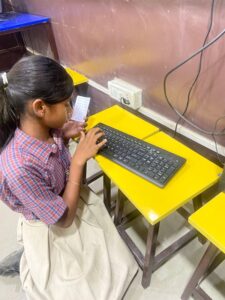
Lesley Keast, one of LightBeam’s earliest volunteers, reflects on the transformation she’s seen. “The children now have SOLE sessions in their learning DNA. They own the enquiry. They direct the wonder.” For her, the project isn’t just about teaching—it’s about being part of a global community stitched together by purpose. “Our WhatsApp and Facebook groups are more than admin tools. They’re our digital campfires,” she smiles.
Sometimes, it’s the smallest moments that leave the biggest marks. In one session disrupted by technical issues, Lesley recorded a video and sent it to the students with a few questions. They responded with videos of their own. One came from Ruby, a student who had never spoken during any session. With support from her peers, she sent a video back—radiant with confidence. “That’s when the ice cracked,” Lesley said.
In another session, students chose their own topics and returned with insights on dark matter and Freud. “We thought those were far beyond them,” Lesley said. “But with no ceilings, they soared.”
The LightBeam Project has no classrooms. And that’s its strength. By embedding itself into existing schools—like DIKSHA in Gurgaon—it stays grounded. DIKSHA, Monika shares, has been a pillar, ensuring support, space, and safety for these sessions. The absence of fixed walls creates a flexibility rare in educational systems. Sessions can happen anywhere children and curiosity meet.

The project’s growth depends on sustained partnerships—with schools, funders, and storytellers. “Support in storytelling,” Monika says, “goes a long way. Stories beam us into places we’ve never been.”
For teachers who feel trapped by rigid systems, Monika’s advice is gentle: Start small. Ask students what they’re curious about. Let them explore. Joy isn’t the enemy of rigour—it fuels it. And agency doesn’t create chaos. It creates connection.
Through The LightBeam Project, Monika Banga has redefined what education looks like in a post-pandemic world. Not transmission, but transformation. Not instruction, but invitation. Each call is a candle lit. Each question, a door opened. Each child, a beam of light—brighter than the last.
Education
Dancing Beyond Boundaries – The Story of Krithiga Ravichandran
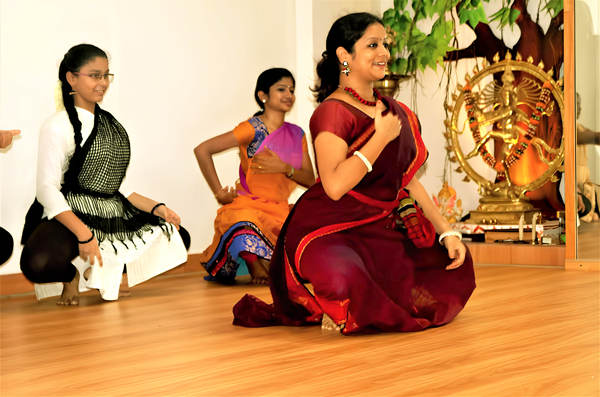
In the heart of Puducherry, where colonial buildings wear salt stains and stories, lives a woman quietly orchestrating a revolution — barefoot, graceful, and defiant. Krithiga Ravichandran, a Bharatanatyam dancer and Assistant Professor of Computer Science, moves between two seemingly different worlds. But look closer, and both are bound by the same rhythm — teaching, nurturing, and transforming.
Born into a family where the arts were heritage, not hobby, Krithiga was raised by the sounds of mridangam, violin, and Carnatic ragas. Her earliest memories? Her grandmother reciting jathis while tapping on a steel plate. “That was my first dance class,” she recalls. “No stage. Just the veranda and a heart full of movement.” By five, she was training formally in Bharatanatyam. And yet, even then, she saw how exclusionary the classical arts could be. The costs — of costumes, jewellery, music recordings — kept so many young girls out.
In 2014, on her birthday, Krithiga founded the Veer Foundation of Arts and Culture Trust, inspired by her father’s values of service. With it, she began offering free Bharatanatyam classes to underprivileged girls. These weren’t just lessons in movement, but in identity. Under temple porticos, community halls, and now small studios, these girls train rigorously — not to perform for others, but to discover themselves.
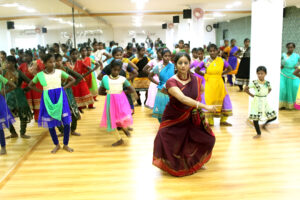
When she’s not dancing, Krithiga teaches Computer Science at Indira Gandhi Arts and Science College.
“Whether I’m breaking down a loop or a mudra, it’s the same joy — watching a student’s eyes light up.”
Her days begin with code and end in abhinaya. Yet, this rhythm energizes her — it’s how she lives her purpose.
Over the years, shy girls who once hesitated to speak now take the stage with confidence. Dance has offered them more than grace — it has given them resilience. “They come unsure,” Krithiga says. “But they bloom. They plan rehearsals, mentor juniors, manage logistics. They lead.” What begins as dance becomes training in leadership, storytelling, budgeting, and cultural memory.
Dancers in the Making, Leaders in the Wings
In a pioneering move, Krithiga introduced Bharatanatyam as a therapeutic tool inside Puducherry’s Central Prison. “It was experimental,” she admits. “But we saw remarkable change — calmness, awareness, even hope.”
Some questioned her decision. “Why offer sacred art to prisoners?” But she insists: “Who better to understand longing and repentance?” To Krithiga, art must include. Art must heal.
Creating safe, inclusive spaces for marginalised girls remains central to her vision. “They don’t just need a guru. They need a safe adult.” She counsels, supports, and makes sure no girl feels alone. From arranging transport to lending jewellery, she builds a circle of trust around them. Much of it runs on her own earnings. “If you believe in something, you fund it — with time, energy, and soul.”
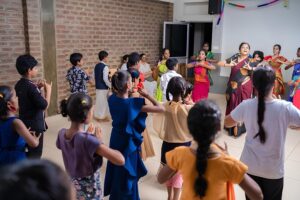
Though she receives small donations — old costumes, music books — she’s kept the work intimate and rooted. “Every piece of jewellery on stage has a story,” she says. “Someone’s daughter outgrew it, someone remembered their Arangetram. It’s a circle of generosity.”
“Dance Doesn’t Ask Who You Are. It Asks, How Do You Feel?”
Krithiga’s vision is to build a holistic centre for classical arts — with a stage, library, wellness wing, and space for reflection. “I don’t want to just train dancers. I want to raise artists — those who know the pulse of the past and can choreograph the future.”
To her, Bharatanatyam isn’t ornamental. It’s essential. A language of liberation — especially for those the world forgets to watch.
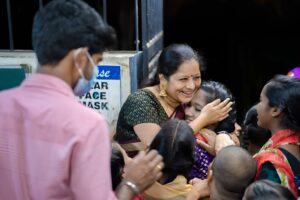
-

 Inspiration3 months ago
Inspiration3 months agoUmeed: A Ray of Hope for Better Tomorrow
-

 Knowledge1 month ago
Knowledge1 month agoBuilding a Healthier India: Why School Health Programs Are Essential
-

 Inspiration2 months ago
Inspiration2 months agoBefore the Nobel, There Was a Teacher
-

 Education2 months ago
Education2 months agoWhat the Indian Army Teaches Our Children Beyond Textbooks
-

 News1 month ago
News1 month agoInclusive Education Summit 2026: Designing the Future of “Learner-Centric” Education
-

 Education4 weeks ago
Education4 weeks agoBeyond the First Bell: 5 Key Takeaways for School Leaders from Economic Survey 2025–26
-

 Education4 weeks ago
Education4 weeks agoSupreme Court’s Landmark Judgment for Schools: Menstrual Health is a Fundamental Right
-
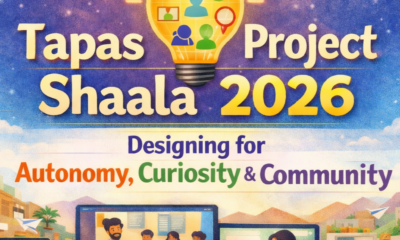
 Education1 week ago
Education1 week agoTapas Project Shaala 2026 to Spark National Dialogue on Autonomy, Curiosity and Community in Education
-

 Education2 weeks ago
Education2 weeks agoJudicial Guardrails: How the J&K High Court’s Fee Regulation Verdict Redraws the Rules for Private Schools
-
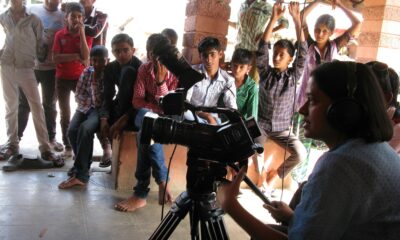
 Education4 days ago
Education4 days agoDaring to Dream: Six Years in the Heart of Rural Rajasthan


